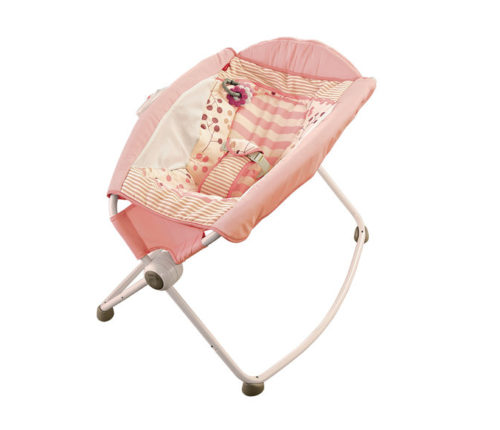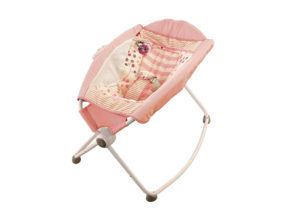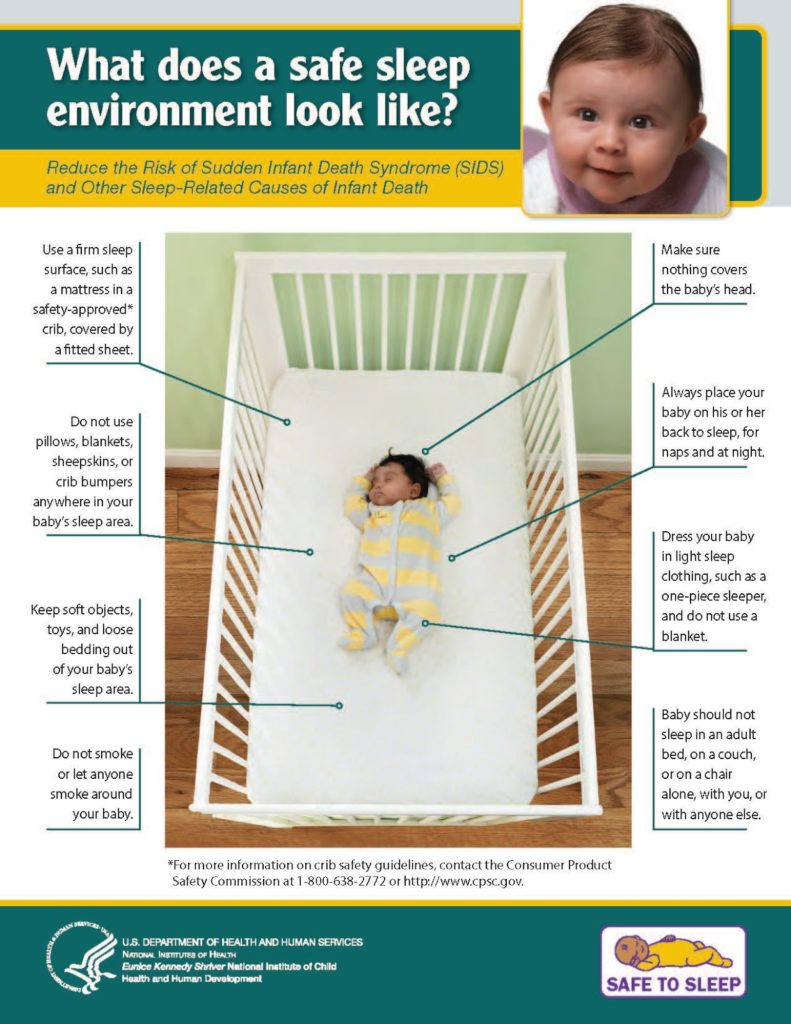
Infant Deaths Linked to Fisher-Price Sleeper Prompt Outrage
Reports of at least 32 infant deaths related to the Fisher-Price Rock ‘n Play Sleeper have sparked outrage after the manufacturer hesitated to issue a recall. Early in April 2019, the popular infant brand issued a joint statement with the U.S. Consumer Product Safety Commission (CPSC) about the potential dangers of their Rock ‘n Play Sleeper.
That initial report was cited as being inadequate in warning parents about the dangers of the product. The American Academy of Pediatrics (AAP) stated,
“The Rock ‘n Play inclined sleeper should be removed from the market immediately. It does not meet the AAP’s recommendations for a safe sleep environment for any baby. Infants should always sleep on their back, on a separate, flat and firm sleep surface without any bumpers or bedding.”
Now, advocacy groups and parents are slamming Fisher-Price for their failure to issue a recall in a timely manner. Though dozens of infant deaths have been linked to this product since 2009, Fisher-Price only just issued a recall for the Sleepers on April 12, 2019.
Details about the Fisher-Price Recall
Fisher-Price is recalling all models of their Rock ‘n Play Sleeper, which is a cloth covered, inclined, and rocking bassinet mounted on a metal frame. The products have been available for purchase since 2009, and it is estimated that 4.7 million Sleepers have been sold.

For consumers, here are details about the recall:
- All 4.7 million Sleepers manufactured since 2009 are included in the recall.
- Retail prices range from $50 to $150
- Recent buyers can expect to be fully refunded for their purchase.
- Parents and caregivers who have owned the sleeper longer than six months will receive a voucher from Fisher-Price towards another one of their products.
- Fisher-Price said it could take 12 to 16 weeks to process returns.
The recall notice from CPSC says consumers should stop using the product immediately and begin the refund process. Any injury or death associated with the use of this product should be reported to the CPSC.
Wavering Before Issuing a Recall
Fisher-Price’s recall came on the heels of widespread outrage over a product safety warning the company issued on April 6, 2019. In a joint statement with the CPSC, Fisher-Price acknowledged that 10 infant deaths were known to have occurred in the Sleeper, but insisted the deaths occurred because of improper use of the product.
Their product safety warning recommended that consumers stop using the sleeper for children older than three months of age or sooner if a younger baby can roll over on his or her own. The warning said that all 10 infant deaths occurred when babies older than three months rolled over in the sleeper without being strapped in by the safety restraint.
Initially, and in collaboration with the CPSC, Fisher-Price assured the public that their product was safe to use for young infants under three months of age as long as caregivers followed the safety instructions for the device.
Pediatrician Groups and Legislators Speak Out
Within a week of Fisher-Price issuing their statement with the CPSC, the company changed their tune and issued a full recall of the Rock ‘n Play Sleepers. Consumer Reports, a consumer watchdog group, performed an independent analysis of the dangers associated with the sleeper and came to a disquieting conclusion.
Consumer Reports discovered that the initial safety warning was incorrect, and that not 10 but 32 infants have died in the Fisher-Price Rock ‘n Play Sleeper. Further, some of the infant deaths were among children younger than three months, which negates Fisher-Price’s claims that the product was still safe.
The AAP cited the Consumer Reports study and called on the manufacturer to recall the sleepers. The pediatrician group said the product was deadly and that the company’s warning was not sufficient to keep babies safe. Not only was the safety warning misleading because it cited facts and statistics that minimized the true prospect of danger, but also consumers can be misled about the urgency of a warning in the absence of a recall. In the interest of preventing more infant deaths, the AAP was adamant and outspoken that the sleeper should be recalled.
The chairwoman of a U.S. Senate subcommittee focused on consumer protection also joined in the outcry by issuing a public plea to Fisher-Price’s parent company, Mattel, to stop promoting and defending the Sleeper and to pull the product from store shelves immediately for the safety of American children.
Already recalled in Australia, and classified as a “soother” not a Sleeper in Canada, the product and its history of infant deaths abounded in controversy and outrage until Fisher-Price came to an agreement with the CPSC to recall the product. Sadly, the recall came too late for the families of the 32 infants who have died while using the product.
Does Regulation Enable Dangerous Products?
The CPSC is a federal agency whose mission is to regulate consumer products and work with manufacturers and distributors to protect consumers from dangerous and deadly products. In both the safety warning and the recall, Fisher-Price collaborated with the CPSC. Their recall was voluntary, and they published the product safety warning as a joint statement with the CPSC.
This begs the question of why a regulatory agency would allow a company to get away with a safety warning for a product like this Sleeper, which was known to cause infant deaths, rather than urge them to recall it immediately?
The New York Times suggested a “shifting” culture of regulation within the CPSC that leans more toward warning than recalls. Though the CPSC can force mandatory product recalls via legal channels, most recalls are voluntary. The commission will approach companies about a recall when:
- The risk of danger is obvious to consumers
- The risk posed by the product is severe
- The risk could impact a significant number of consumers
It seems like the Fisher-Price Sleeper should have been recalled from the start. With almost five million products sold, that certainly impacts a large number of consumers. Making matters worse, it is innocent and defenseless infants who are vulnerable to the dangers.
In an effort to determine why the product was not recalled, The New York Times spoke to a former director of the CPSC who said the commission is engaged in a dangerous trend of issuing more warnings than recalls. Recently, the CPSC has been issuing dozens of warnings each month, but has only collaborated on about half a dozen recalls.
The result of this dangerous practice is that the warnings are largely ignored by consumers. Warnings don’t convey a sense of urgency, and don’t get the same media attention that recalls do. Regardless, the CPSC has defended its actions both at the time of the safety warning and also now that there is a recall.
The former director suggested that any product associated with infant deaths does not merit a product safety warning. In the case of the Fisher-Price Rock ‘n Play Sleeper, the warning didn’t do enough to make it clear to parents that their child could die if they use this product. A recall is the more appropriate response to such chilling potential danger.
Now that the recall is public, the CPSC is launching an investigation into products similar to the Fisher-Price Rock ‘n Play Sleeper. The inclined design of the Sleeper is thought to have contributed to some of the infant deaths with these products, so the CPSC says it is conducting an investigation into other incline sleepers as a priority.
Families who lost their babies as a result of this product are considering taking legal action against the company. Though the recall is a necessary step toward protecting other children from this product, 32 children died before this recall could warn other parents. Those families deserve justice.
A Dangerous Sleeping Environment
Amid all the controversy about regulation and recalls, the most important thing for parents and caregivers to keep in mind is why this product is so dangerous. The AAP recommends babies sleep on their back on a flat and firm surface. The Rock ‘n Play Sleeper allowed children to roll over in their sleep, which caused them to suffocate on the padded sides. The Sleeper also allowed babies to sleep at an incline, which is dangerous for infants as they can die if they sleep at an incline because that position can crush or collapse the trachea.
Side sleeping or stomach sleeping is also presumed to be dangerous. The well-known “Back to Sleep” campaign has dramatically decreased instances of Sudden Infant Death Syndrome (SIDS), which is associated with unsafe sleep environments.

SIDS Safety Basics Help Prevent Infant Deaths
Doctors don’t understand everything about SIDS, but there are some safe sleeping practices which seem to reduce the risk:
- Put your baby to sleep on his or her back.
- Have babies sleep on a flat and firm surface.
- Do not use crib bumpers or fluffy blankets.
- Do not smoke. Even secondhand smoke exposure increases the risk of SIDS.
- Keep your baby close by. Sleeping in the same room as the mother decreases the risk of SIDS.
- Dress your baby appropriately to prevent overheating.
Get Legal Help from Compassionate Infant Death Lawyers
Companies like Fisher-Price have an obligation to develop and sell products that consumers can trust to be safe. Moreover, when they have information about the risk of death or serious injuries associated with one of their products, companies have an obligation to make the danger unequivocally clear to consumers who may be in harm’s way.
Fisher-Price sold a Sleeper so dangerous as to be deadly, and then delayed issuing a recall in favor of an ineffectual safety warning. At Birth Injury Guide, our lawyers find Fisher-Price’s actions to be unacceptable. We extend our most sincere condolences to the families who lost their infants because of this dangerous product.
Parents whose infants have been injured or killed after using a Rock ‘n Play Sleeper should contact our lawyers to find out more about their legal rights. Many families are already exploring their options to file legal claims in this matter. Call our office at 1-877-415-6603 to learn more about your rights and options, or submit our contact form online.

